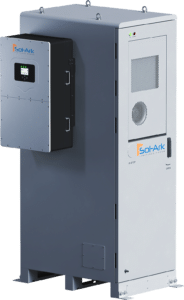Commercial Hybrid Inverters & Lithium-Ion Batteries: Future-Proofing Modern Businesses Energy Needs

The Role of Hybrid Inverters in Business Energy Systems
Commercial hybrid inverters, like the Sol-Ark 60K-3P-480V, are a critical component in commercial energy systems. These inverters work by converting solar power into usable AC electricity while also providing backup power capabilities during grid outages. For businesses, hybrid inverters offer flexibility and resilience by seamlessly integrating renewable energy with existing grid infrastructure. This helps to ensure uninterrupted power supplies during brownouts or blackouts. This feature is especially beneficial for businesses that rely on consistent energy supply, such as data centers, pharmacies, and telecommunications.
Hybrid inverters can significantly reduce energy costs by optimizing solar energy use as commercial electricity prices are expected to remain high in the coming years (Deloitte United States) (EY Home). By reducing reliance on grid power, hybrid inverters can help businesses achieve substantial cost savings and reduce their carbon footprints.
Lithium-Ion Batteries: Ensuring Commercial Energy Storage Availability and Stability
Pairing hybrid inverters with high-density (HD) lithium-ion battery systems, like the Sol-Ark L3 Series Lithium-Ion BESS, further strengthens energy systems by providing energy storage capabilities. These batteries allow businesses to store excess energy generated during peak sun hours and utilize it when the sun isn’t shining, or when grid prices are high.
HD lithium-ion batteries are valuable for businesses aiming for energy independence. They not only provide a backup power source during grid interruptions but also help stabilize the energy supply by regulating fluctuations in energy production. As utility-scale solar installations are projected to reach record levels in the coming years, the demand for complementary energy storage systems will likely follow suit (EY Home) (The Business of Sustainable Energy).
Lithium-ion batteries also play an essential role in supporting renewable energy variability by providing firming capacity. This means they can deliver consistent power and translates into a more reliable energy supply that can keep operations running smoothly even during peak demand or less favorable solar conditions.
Embracing a Hybrid Commercial Energy Storage Approach
Commercial hybrid inverters and lithium-ion batteries offers a unique advantage for commercial entities seeking to future-proof their energy infrastructure. As the energy grid becomes increasingly stressed with rising electrification with electric vehicle (EV) adoption and the growth of data centers, businesses will need robust, flexible systems capable of adapting to fluctuating grid conditions (McKinsey & Company).
According to the International Energy Agency, global renewables are projected to grow significantly as businesses and nations strive to meet net-zero targets. Adopting solar and storage solutions now can help companies comply with future regulatory requirements and position them as leaders in sustainability (EY Home) (The Business of Sustainable Energy). Moreover, this will align well with broader sustainability and decarbonization goals, which are gaining traction in both policy and practice.
Commercial Energy Storage Benefits for Industries & Businesses
Cost Efficiency
With energy costs rising, solar hybrid inverters and lithium-ion batteries offer a way to reduce grid reliance, leveraging cost-free solar energy and providing energy storage to optimize usage during peak periods. This setup can lead to substantial cost savings over time, particularly for energy-intensive sectors.
Resilience and Reliability
By enabling continuous operations during grid failures, these systems ensure that critical functions can continue without interruption. For businesses that can’t afford downtime, such as hospitals, data centers, and industrial facilities, this is a crucial advantage.
Environmental Impact
Utilizing solar energy and storage helps reduce greenhouse gas emissions and supports corporate sustainability initiatives. Businesses increasingly face pressures to demonstrate environmental responsibility, and a hybrid energy system directly contributes to lower carbon emissions.
Adaptability
The scalability of lithium-ion storage systems allows businesses to expand their energy storage capacity as needed. Hybrid inverters can also be upgraded to accommodate additional renewable sources, making them a future-proof investment that grows with the business.
 Looking Forward: A Strategic Business Investment
Looking Forward: A Strategic Business Investment
Implementing solar hybrid inverters and lithium-ion battery systems is more than just a short-term solution for businesses; it’s a long-term investment in operational resilience and environmental stewardship. With the U.S. expected to see continued growth in clean energy investments and energy storage capacity, businesses have a unique opportunity to future-proof their energy systems and gain a competitive edge in an increasingly sustainable economy (Deloitte United States)(McKinsey & Company).
For companies navigating today’s dynamic energy landscape, the combination of solar hybrid inverters and high-density lithium-ion batteries is essential to building a reliable, cost-effective, and environmentally responsible energy infrastructure.
References:
- Deloitte Insights: https://www2.deloitte.com/us/en/insights/industry/power-and-utilities/power-and-utilities-industry-outlook.html
- McKinsey & Company: https://www.mckinsey.com/industries/energy-and-materials/our-insights/global-energy-perspective
- EY (Ernst & Young): https://www.ey.com/en_us/insights/power-utilities/utilities-sector-outlook
- Business Council for Sustainable Energy (BCSE): https://bcse.org/market-trends/2024-key-trends/


 Looking Forward: A Strategic Business Investment
Looking Forward: A Strategic Business Investment